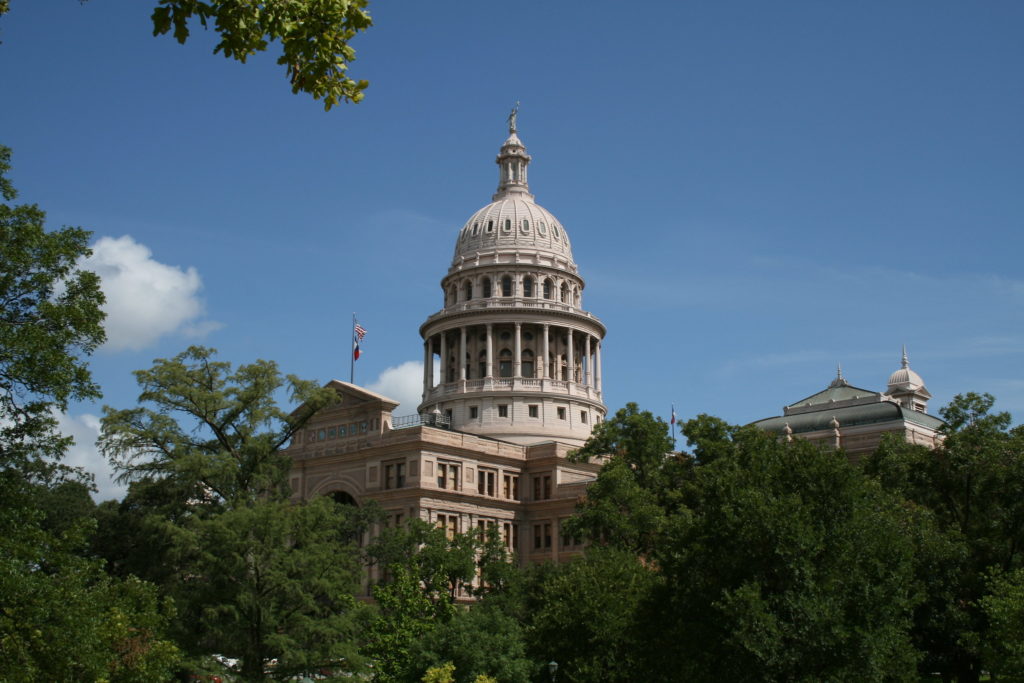Texas Democrats Deny Quorum, Delay Elections Bill
A special session looms. (And how this is not like the filibuster in the US Senate).

The Texas Tribune reports: Texas Democrats abandon House floor, blocking passage of voting bill before final deadline.
on Sunday night, with an hour left for the Legislature to give final approval to the bill, Democrats staged a walkout, preventing a vote on the legislation before a fatal deadline.
“Leave the chamber discreetly. Do not go to the gallery. Leave the building,” Grand Prairie state Rep. Chris Turner, the chair of the House Democratic Caucus, said in a text message to other Democrats obtained by The Texas Tribune.
Senate Bill 7, a Republican priority bill, is an expansive piece of legislation that would alter nearly the entire voting process. It would create new limitations to early voting hours, ratchet up voting-by-mail restrictions and curb local voting options like drive-thru voting.
Democrats had argued the bill would make it harder for people of color to vote in Texas. Republicans called the bill an “election integrity” measure — necessary to safeguard Texas elections from fraudulent votes, even though there is virtually no evidence of widespread fraud.
The legislative session was set to expire at midnight, hence the deadline. For a vote to take place the chamber needed a quorum, which is defined in this case as 2/3rds of the membership. By exiting before the vote, Democrats denied the chamber quorum and the vote could not proceed.
By 11:15 p.m. about 30 Democrats could be seen arriving at a Baptist church about 2 miles away from the Capitol in East Austin.
The location for Democrats’ reunion appeared to be a nod at a last-minute addition to the expansive bill that set a new restriction on early voting hours on Sundays, limiting voting from 1 p.m. to 9 p.m. Over the last two days, Democrats had derided the addition — dropped in during behind-closed-door negotiations — raising concerns that change would hamper “souls to the polls” efforts meant to turn out voters, particularly Black voters, after church services.
Standing outside the church, Democrats said the walkout came only after it appeared Democrats’ plan to run out the clock on the House floor with speeches wasn’t going to work because Republicans had the votes to use a procedural move to cut off debate and force a final vote on the legislation.
“We saw that coming,” said state Rep. Nicole Collier, a Fort Worth Democrat and chair of the Texas Legislative Black Caucus. “We’ve used all the tools in our toolbox to fight this bill. And tonight we pulled out that last one.”
With about an hour left before the midnight deadline, House Speaker Dade Phelan acknowledged the lost quorum and adjourned until 10 a.m. Monday morning. Midnight was the cutoff for the House and Senate to sign off on the final versions of bills that have been negotiated during conference committees.
It should be noted that this was a temporary win for those opposed to the bill, as Governor Abbott will be calling a special session:
while Democrats were able to defeat the legislation Sunday, Abbott quickly made clear he expected lawmakers to finish the job during a special session.
“Election Integrity & Bail Reform were emergency items for this legislative session. They STILL must pass. They will be added to the special session agenda,” he said in a post on Twitter. ”Legislators will be expected to have worked out the details when they arrive at the Capitol for the special session.”
The state’s constitution creates very limited regular legislative sessions. Indeed, the constitution dictates that they meet for only 140 days in odd-numbered years only. Hence, special sessions are not out of the ordinary, especially as the needs of a large state in landmass, population, and economy, have grown in complexity since 1876 when the current constitution was ratified. It should be further noted that the constitution dictates that the governor sets the agenda for those sessions: “Article 3, Section 40 of the Texas Constitution states that when the Legislature is convened in special session, there shall be no legislation upon subjects other than those designated in the proclamation of the Governor calling such session, or presented to them by the Governor” (Source: the Legislative Reference Library of Texas).
So, while the opponents of the bill are currently victorious, it is unlikely they will be able to stop the legislation from going forward in the special session.
(I am getting flashbacks to the last time I taught “Texas Government” in the summer of 1998).
When I first heard this news last night and again this morning, I started to expect that someone would try to make the argument that this is no different than the filibuster in the US Senate/an example of a minority veto. Indeed, I have little doubt people like Tucker Carlson and the like will make snide comments to that effect.
But, I would note several things.
First, as I have already stated, this was a mere stalling tactic. The potentiality of a special session was always there and Texas Democrats certainly understand the near inevitability of this bill’s passage. But, delay does allow a legislative caucus to live to fight another day, and that provides at least a chance to change minds or generate public pressure to alter votes.
Note how this is very different from a real minority veto: the minority knows that unless it can use the time it has bought to become the majority on this topic, that they will still lose.
Second, using a hard timeline and quorum busting is a limited gambit. Running out the clock can only be done at the literal last minute, so it something that can only be deployed infrequently (and it has to be done as a surprise (hence the directive to be discreet when exiting noted in the on f the quotes above), lest the chamber be sealed before the vote is taken, which is a counter-measure to parties trying to deny quorum).
Not only can the majority thwart quorum busting by making everyone stay on the floor, they can also deny having the clock used against them by not letting a controversial bill come up at the very end of the session.
In other words: a) this is a rare, one-shot tactic and b) the majority has tools to stop it.
Third, the Democrats had some reasonable cause to want a delay because a lot of changes had been made by the majority and time for full debate was not available:
SB 7 was one step away from the governor’s desk. It was negotiated behind closed doors over the last week after the House and Senate passed significantly different versions of the legislation and pulled from each chamber’s version of the bill. The bill also came back with a series of additional voting rule changes that weren’t part of previous debates on the bill, including new ID requirements for voting-by-mail, restrictions on Sunday early voting hours and a higher threshold for who can qualify to vote by mail based on a disability.
So, they can have a more fulsome debate in the special session. (Not that it is likely to change the ultimate outcome).
Fourth, this is a real example of extraordinary minority legislative power being exerted to try and protect literal minority rights, since the bill is designed to make voting more difficult. Moreover, it will make it especially more difficult for minority voters to vote. This is the kind of thing wherein one would expect the party interested in protecting rights to pull out all of their legislative options to stop a bill from passing.
At any rate, two main take-aways here.
One, this was a delay and nothing more. The odds heavily dictate that that SB 7 will pass in the special session.
Two, anyone who tries to equate this to the filibuster/legislative minority power in the Senate is well off base.
For the record: if the filibuster was nothing but a delaying tactic used to try and actually change minds (either directly in the Senate chamber or indirectly by moving public opinion) or to change the bill to make it more palatable to the minority, but that would eventually result in a vote wherein the majority carried the day, I would have no problem with it as a tool. Giving a minority the power to delay is radically different than the power to veto.






This is the kind of thing that need be done to fight thr Trump Cult”s efforts to undermine Amerocsn democracy
Perhaps (already? soon?) the political rights of the majority as well.
Precisely: extraordinary.
If the use of the filibuster, or other mechanisms allowing for a minority to veto the majority, becomes routine, then it’s a mechanism of minority rule, not of protection of minority rights.
there remains one question: is a quorum required in a special session?
If it is, then the Democrats can simply not attend the session.
So, by denying quorum, the Democrats are making it hard for the Republicans to vote on a bill making it hard for Texans to vote — particularly Texan Democrats. That seems appropriate.
And if they are pulling in new provisions out of thin air in conference committee, there should be time for a full public airing of the finished bill.
Since a lot of this is going to end up being decided in the courts, though, I wonder whether we are better off just letting it pass soon, and getting the lawsuits started.
Nice to see some Democrats with actual balls.
I saw a picture, most of them were women.
Let’s get them in the Senate.
@Kathy:
Yes, quorum is required. They would need to leave the state, however, and stay out for the length of the session to keep this up. Else, they can be compelled to attend.
I saw an article somewhere a couple days ago talking about this business of cramming a bill through at the end of a session without review of last minute changes. Said this has become part of the standard Republican playbook. Along with passing bills late at night, which IIRC Moscow Mitch tried to do with the 1/6 commission.
If you can’t stop it, maybe you can make it more visible. I’d be good with a talking filibuster, so some GOP would have to stand in front of the press corps and C-SPAN and be the face of obstructing the 1/6 commission.
@Kathy:
If I recall correctly — it’s been a long time since I lived in Texas — the chairs of each chamber have the authority to compel presence. Sometime not too far back, the minority Republicans in Oregon, I think it was, did the same quorum trick and fled to a neighboring state so the Oregon state police could not arrest them.
@Steven L. Taylor: IIRC the Ds tried denying a quorum on some anti-union bill in WI. I forget how it all turned out, I think just delaying the inevitable. But the Ds stayed at a motel over the state line in IL while then Governor Walker sent the WI state cops out looking for them.
@Michael Cain: IIRC (and I have been too lazy to Google it), there were at least two recent (within the last decade or so) attempts in Texas at breaking quorum by having the requisite number of the minority party camping out of state for a protracted period.
And yes, the leadership of the legislatures can order them to be at the capitol (and can deploy, again IIRC, the Texas Rangers to go round them up).
Here is some info.
It only listed Texas in 2003 (my, home time flies), but I could swear there was another attempt more recently.
And yes, the Rangers can be deployed.
@Steven L. Taylor:
@Michael Cain:
I’d read something like this before regarding Texas. I assume it can be done, especially if not all Democrats need to leave the state, just enough so there’s no quorum.
On the other hand, there’s mere passive resistance. If the state police shows up to arrest a legislator, they just sit on the ground and refuse to move. This works best if they all gather in one place, say near the state capitol, and dare the police to use force.
The downside is the police would use force (see last summer if there’s any doubt). But then the footage of police beating up passive legislators would be epic.
@Kathy: They would need to leave the state.
An additional contrast to the current version of the veto in the US Senate, this quorum tactic stops all business. I have complained before that in the US Senate the problem is not so much that Senators don’t have to keep talking for a filibuster, it’s that the Senate rules allow for dual tracking: other business can be conducted even though there is a bill being filibustered. Mitch McConnell’s attitude towards the filibuster might have been quite different in the last Congress if a Democratic filibuster of a bill also stopped all the judicial confirmations from proceeding.
It should be noted that only 4 states require a 2/3 quorum. Most states (and the federal congress) only require a majority quorum, so a minority walkout generally won’t make a difference unless the bill wasn’t going to pass anyways.
@gVOR08:
This is why the Texas gambit is so different than the Senate silent filibuster. Significant changes were made behind closed doors and the bill was brought for action too late for any debate. But, with this action, the Texas Democrats bring these changes into the light – every story about their absence gives visibility to the nature of the secretive legislative changes – more Texans will hear a different perspective than the one Abbott will give at his signing ceremony. When you’re losing so bad in battle against voter suppression, this counts as a win.
Though it would be better if it was, the Senate filibuster doesn’t have to be eliminated. I’m pray Manchin and Sinema can see how important it is to at least force public debate.
@Michael Cain:
I don’t think that could work when one party is too happy to obstruct the other in all legislation, and when the Senate rules are changed with a bare majority.
The Democrats wouldn’t institute such a rule now, because then they couldn’t confirm any judicial nominations. If they did late in 2022, to stick it to the incoming GOP majority (if any), once in power I’ve no doubt Mitch would change the rules.
Manchin and Sinema need to take one for the team and repeal the filibuster, so bills for long term electoral reforms can pass.
@Michael Cain:
I remember the Oregon thing. The Governor asked the state police to bring the legislators back. One of the legislators not-so-vaguely threatened to resist via gunfire any attempt to bring him back to Salem.
@Kurtz: Texas DID just pass the “no license necessary” law….it would be kinda fun to see the Texas Dems feed the “Oregon protocol” right back to Abbott.
Abbott has promised
The reaction of Republican members has not been reported.
Abbott’s assertion that the bill is required to meet an “emergency” is another example of the cynical way Trump Republicans abuse the processes of government for partisan advantage. But when the chair of the state Republican committee, Allan West, is in Dallas attending a QAnon circus with Mike Flynn, it’s clear the party has abandoned all the norms that have traditionally underpinned the republic’s democratic governance.
@Kathy: “The downside is the police would use force (see last summer if there’s any doubt). But then the footage of police beating up passive legislators would be epic.”
The right would love it, and decent people don’t have power in Texas.